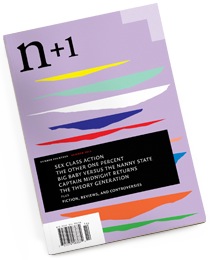
n+1 is een bijzonder Amerikaans tijdschrift. Een must voor deze tijd. Hieronder een stuk over de meritocratie, het credentialisme of de diplomafabriek; hoe diploma's belangrijker zijn dan werkelijk intellect en geld een steeds grotere rol speelt bij de toegang tot de macht.
Er is sinds kort ook een nieuw Nederlands literair tijdschrift, Das Magazin, dat wordt gesponsord door n+1. Ik hoop dat het ooit ook politieke en economische kwesties gaat bespreken, zoals hun Amerikaanse sponsor dat doet. Het is in elk geval zeer mooi vorm gegeven.
n+1: "Our elaborate, expensive system of higher education is first and foremost a system of stratification, and only secondly — and very dimly — a system for imparting knowledge.
From the first, their chief mission was to produce not learning but graduates, with teaching subordinated to the process of certification — much as artisans would impose long and wasteful periods of apprenticeship, under the guise of “training,” to keep their numbers scarce and their services expensive.
Like cigarette duties or state lotteries, debt-financed accreditation functions as a tax on the poor. But whereas sin taxes at least subsidize social spending, the “graduation tax” is doubly regressive, transferring funds from the young and poor to the old and affluent.
Student-loan asset-backed securities are far safer than their more famous cousins in the mortgage market: the government guarantees most of the liability, and, crucially, student loans cannot be erased by declaring bankruptcy.
... as long as access to the workforce is controlled by the bachelor’s degree, students will pay more and more.
When we ask ourselves whether populist hostility should be directed against the rich or against the professional elite, the answer must be, “Yes, please!” From 1980 to 2007, the financial sector grew from 4 percent of GDP to 8 percent, but it’s shrunk since and may shrink further. The medical sector, on the other hand, grew in the same period from 9 percent to 16 percent — and is expected to account for a full 29 percent of the economy by 2030. Goldman Sachs makes for an attractive monster, but the bigger vampire squid may be the American Medical Association, which has colluded in blocking universal coverage and driving up health costs since World War II.
No one would advocate staffing the country’s ministries with wealthy imbeciles, as was the custom under George W. Bush; but the President — a meritocrat himself — has succumbed to what might be called the “complexity complex,” which leads us to assume that public policy is so complicated that you need a stack of degrees to figure it out. But major political questions are rarely complex in that sense. They are much more likely to be complicated, in the Avril Lavigne sense, meaning that they involve reconciling disagreements among competing stakeholders — or, as the situation may demand, ratcheting them up.
Dignity must be restored to labor, and power and ecumenicism to labor unions. On the other side the reverse must happen: dignity must be drained from the credential. Otherwise, the accreditation arms race will become more fearsome. Yesterday’s medals will become tomorrow’s baubles, and the prizes that remain precious will be concentrated in fewer and fewer hands.
In our pay-to-play society, many of those toward the bottom of the educational pyramid are getting fleeced; others, though, are getting a leg up. Because it’s callous and unreasonable to ask the disadvantaged to decline opportunities to advance, subverting credentialism must start at the top.
A master’s degree, we might find, burns brighter than a draft card."
Zo, daarmee is ook duidelijk dat Rutte II afstevent op hetzelfde systeem van credentialisme dat studenten belast met een grote schuld en studeren voorbehoudt aan de gegoede klasse.

